Why The Cause of Your Unwanted Weight Gain Isn’t What You Think

It’s happened to the best of us. You wake up one day and realize you’re more of a person than you used to be—literally. Is it the “freshman 15” coming back to haunt you again, or is it some other turning point in life causing the seemingly sudden gain in pounds?
Maybe you just got married; you’re enjoying happy marital bliss (see: bloat) as you savor all those wonderful meals together. Or maybe you finally quit smoking and feel so good about it. You’re taking control of your health only to find a few months later that the scale is tipping 15 pounds heavier. How did that happen? You aren’t eating any more than you used to.
The holidays are a time for weight gain too. It’s not just the goodies that are to blame, but also the stress and alcohol that lead to raised cortisol and insulin levels—ingredients for the perfect weight gain storm.
There are plenty of other reasons for unwanted weight gain. What exactly are those and how do they occur? And then what are the mechanisms and root causes behind them? Are there any quick, natural solutions (yes)?
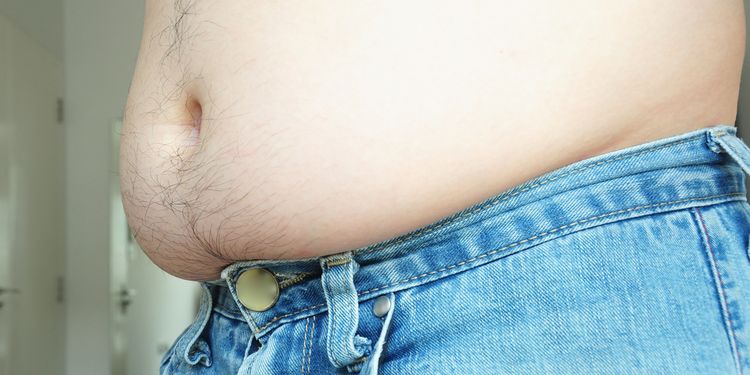
What’s Your Unwanted Weight Gain Trying To Tell You?
It’s certainly puzzling to experience unwanted weight gain, especially if you’ve been eating right and working out.
You’re gaining weight without trying to, and you’re not really sure why. There are times when a medical condition can be the cause. Other times, life and its stressors can be part of what’s driving those pounds to cling on.
Unwanted weight gain is a sign. It’s a loud message that there’s something going on in your body. Dr. Mark Hyman says, “If we listen carefully, our body speaks to us and provides us with the exact information we need in order to reach our individual health goals. For many, achieving your weight loss goal is your number one priority. It may be difficult to see that weight, in some ways, is merely a symptom.”
Unwanted weight gain is like an iceberg. You see the extra pounds, but underneath lies hormones gone awry, circadian rhythms out of sync, a slower metabolism, and many other metabolic imbalances that have shifted just enough to move the needle of the scale toward weight gain we haven’t seen before.

How Does Unwanted Weight Gain Occur?
Genetics, diet, lifestyle, hormone balance, and inflammation levels all play a role in weight gain.
If you come from a family with a history of obesity, you have a higher risk of gaining unwanted weight and becoming obese.
The US Dept. of Human Health and Human Resources states that there’s a 75% chance you’ll be overweight if your parents are obese, and if one parent is obese, there’s a 25-50% chance of being overweight.1
Diet, and specifically the quantity and quality of the food you ingest, has a strong impact on your weight. Diets high in sugar, carbohydrates, processed food, and bad fats promote weight gain through blood sugar dysregulation and inflammation.
Sleep deprivation also has huge implications in weight gain, since sleep is necessary for hormone balance and healing/regeneration.
In one of the largest and longest studies recorded, 60,000 women were followed for sixteen years. In the beginning, all were healthy and not overweight. Those women who got five hours of sleep or less per night had a 15% higher risk of becoming obese than those who slept seven hours per night.2
There are many health conditions that can cause unwanted weight gain, including an underactive thyroid (hypothyroidism and Hashimoto’s), Cushing syndrome, polycystic ovarian syndrome, and kidney failure.
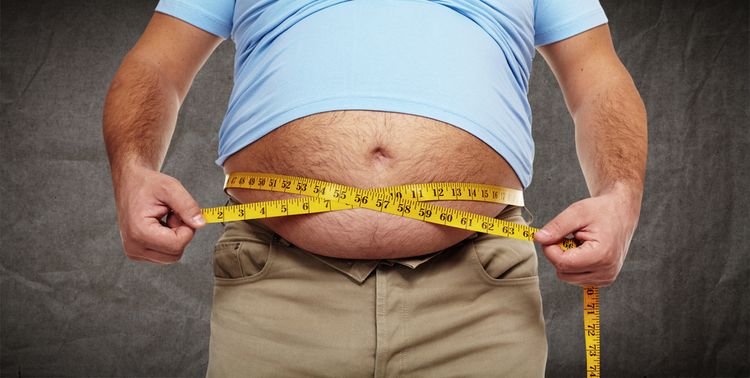
Symptoms of Unwanted Weight Gain
There are a number of symptoms connected with being overweight—some are more apparent than others:
- Breathlessness
- Increased sweating
- Snoring
- Difficulty sleeping
- Inability to cope with sudden physical activity
- Back, knee, and joint pain
- High blood pressure
- High cholesterol levels
- Diabetes
- Depression
- Gallbladder or liver disease
- Heart disease
- Certain types of cancer (prostate and bowel in men, breast and uterine in women)
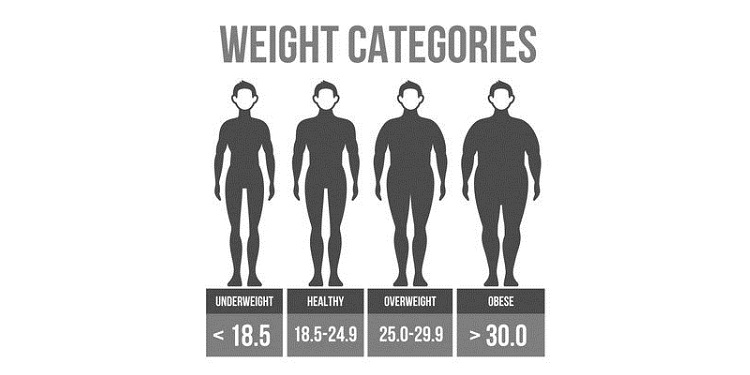
Types of Unwanted Weight Gain
According to the Centers for Disease Control and Prevention, about 35% of adults twenty years and older are obese.
If we include those overweight in this number, it jumps up to 69%. The average American weighs 24 pounds more than in 1960.
Body Mass Index (BMI) is the accepted metric for defining overweight and obesity. It’s a type of measurement of adiposity, or fat storage.
The calculation takes your body mass in kilograms, divided by height squared in meters. It’s not the most accurate measurement of fat tissue; for example, 48% of women classified as non-obese by BMI calculations were found to be obese when body fat was measured by DXA (dual energy x-ray absorptiometry).3 The World Health Organization classification of weight by BMI is:
Overweight: When your BMI is 25-29.9
Obese class I: When you BMI is 30-34.9
Obese class II: When your BMI is 35-39.9
Obese class III/morbid obesity: When your BMI is 40.0 and above3

Root Causes of Unwanted Weight Gain
There are many reasons for weight gain, but the most common contributors are eating too much, especially the wrong things, as well as physiological and psychological causes.
Excessive calorie intake and lack of physical activity/exercise are a major contributor to weight gain because glucose is not being used, so it’s stored as fat.
Poor-quality nutrient intake is a close second to eating too much as a cause of gaining weight.
Toxic exposure and inflammation is a very big contributor to weight gain. The chemical element from toxins and the fire raging internally from inflammation will sabotage any effort you have to lose weight.

Physical root causes include a sluggish metabolism with poor gastric emptying.
Stomach motility is slowest in the evening, which is why whatever you eat at night (especially later in the evening) lies undigested in the small intestine, where it ferments.
Gut microbes harvest extra calories from the foods that you eat if you don’t have good gastrointestinal motility.
If you investigate the stool of overweight people compared to lean people, there’s more calorie density in the stool of lean people because of a fast, efficient gastric emptying system.11
Psychological root causes include depression, stress (stress eating can add 11 extra pounds a year according to a recent study from Ohio State University), post-partum syndrome, and anxiety.
Genetic root causes only account for a small percent of the overweight-obese population. Dr. Joseph Majzoub tells us, “Thus far, mutations in about eight genes are known to cause obesity in humans. But these mutations account for under 5% in our society, and certainly are not, by themselves, responsible for the current obesity epidemic.”

Root Cause: Excessive Calories/Poor-Quality Nutrient Intake
Most of us know enough to stay away from the “super size me” fast food campaigns, and while “you can’t eat just one” may be true, we’ll think twice before downing an entire bag of Frito Lays potato chips.
And when Little Debbie tells us we’re going to “unwrap a smile” if we eat one of her cakes, we’re not buying into that lie.
But where it starts to get fuzzy is that breakfast protein bar that’s nicely advertised with glasses of water and salads, and promises that we’ll “eat better all day”—in reality, that tasty tidbit is laced with trans fats. When’s the last time you saw a commercial or read an ad on fruits and vegetables?
The reality is that we’re consuming far more poor-quality calories than our forefathers. According to the USDA, the average person in the US consumes 150-170 pounds of sugar a year.

Compare that to 1900, when individual consumption was around 90 pounds per year. Sugar is added to soft drinks, fruit juices, sports drinks, energy drinks, bologna, pretzels, Worcestershire sauce, and cheese spread, to name a few. It’s often included in meat processing. And the addictive nature of sugar can be worse than cocaine.13
Take for example the quintessential “Joy of Cooking” cookbook. Since its inception in 1936, to date, the recipes contain 35% more calories than the original did!
It isn’t difficult to eat excessive calories; in fact, it’s very easy. Just eat out every day and chances are you’ll gain weight, if you’re not careful.
The general consensus is that to maintain your weight as an average-sized, medium-build male office worker, you should consume around 2,200-2,500 calories.
If you went out for lunch and had an individual pizza, side salad and a soft drink, you would be consuming 1,960 calories just at lunch alone!
Fast food is known for its large portions, high palatability, and high sugar content, all of which lead to overeating and weight gain.
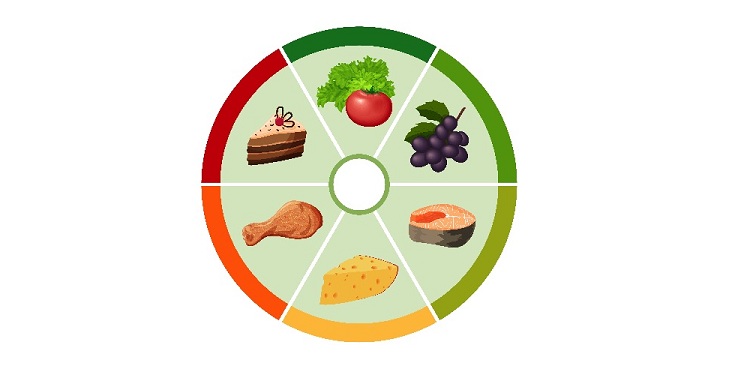
The CARDIA study, which followed 3,000 young adults for 13 years, found that those eating the most fast food gained an average of 13 pounds more than the people who didn’t. They also had larger waist circumferences (visceral fat) and elevated triglycerides.
Not all calories are created equally. 90’s dogma says a calorie’s a calorie, which is simply wrong. It matters greatly what that calorie represents.
The macronutrients consist of carbohydrates, fat, and protein.
A calorie from carbohydrates affects your body very differently than a calorie from fat.
Eating a higher protein, higher fat, and lower carbohydrate diet is the most efficient and effective way to manage weight.
Poor-quality nutrient intake is an important factor in shaping our gut ecosystem.
For example, a diet of highly-processed foods has been linked to a less diverse microbiota. New evidence indicates that gut bacteria alter the way we store fat, how we balance levels of glucose in the blood, and how we respond to the hormones that make us feel hungry or full (leptin and ghrelin).
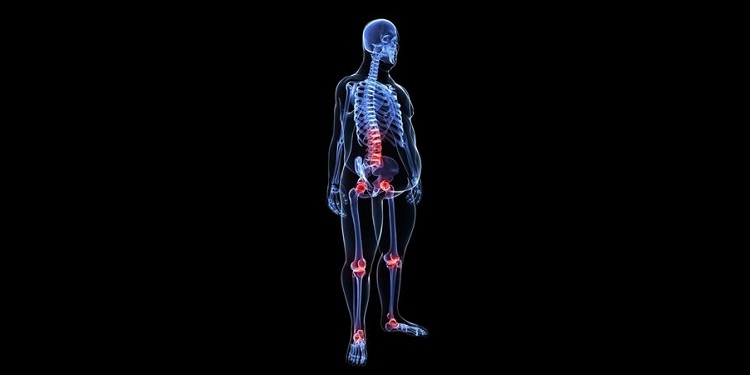
Root Cause: Toxic Exposure and Inflammation
A recent article in The Lancet revealed something quite disturbing—an association between environmental pollution and diabetes.
The chemicals hijack our body’s ability to balance blood sugar and metabolize cholesterol, making us fat and sick in an epidemic Dr. Mark Hyman calls “diabesity.”
With over 4,000 chemicals introduced into our environment every year, it’s no wonder our body has a hard time keeping up.
The CDC recently performed a study that found that nearly every person was packed with a host of nasty chemicals, including flame retardants stored in fatty tissue and Bisphenol A (BPA) excreted in urine.

Bisphenol A is found in a whole host of products, including plastic water bottles, the lining of beer cans, canned foods, and the cover for that coffee you just bought; the steam’s hitting the cover, causing the toxins to leach into your coffee. BPA is a xenoestrogen—a hormone-like substance that mimics estrogen in your body—disrupting your endocrine system.
Inflammation has been shown to precede the development of diabesity. Elevated levels of pro-inflammatory cytokines are involved in the upregulation of inflammatory reactions. They’re also involved in the process of pathological pain.
Almost always when they’re present, they’re predictive of future weight gain. Inflammation gravitates to fat cells, starting an inflammatory cascade. As fat mass expands, inflammation increases. As more glucose is delivered to the fat cells, they produce an excess of reactive oxygen species, which further fuels the inflammatory cascade.
When this occurs, inflammation affects virtually everything—the brain, the gut, our mitochondria, and our hormone regulation.
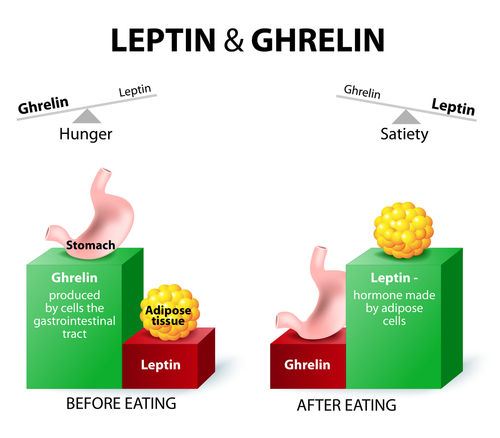
Root Cause: Hormone Imbalance
Hormones, or lack thereof, are often to blame for the increase in weight we tend to see in our early thirties.
A natural lack of estrogen receptors in the brain due to aging causes mice to gain weight without consuming more calories, researchers at the University of Texas Southwestern Medical Center found.
The same thing happens with humans. We tend to put on 10% more weight per decade because of how our hormones change as we age. Testosterone levels in both men and women decrease as we age. Testosterone helps to regulate muscle mass, and the more muscle you have, the faster your metabolism runs.15
Hormones are a very delicate symphony. And as in a real symphony, if one instrument is slightly off, it affects the outcome of the orchestra.
Hormones play a significant role in metabolism—how you use your food as fuel, whether food gets stored or burned, whether you feel hungry or full, whether you experience cravings or not, your mood, and even your motivation to exercise.
Some of the key hormones in weight gain are insulin and leptin. Insulin is the hormone that tells our cells to pick up glucose from the bloodstream. It’s also the major energy storage hormone in the body. It tells our cells to store energy, either as glycogen or fat.
According to Dr. Lustig, one of the ways that insulin contributes to obesity is by blocking the leptin signal in the brain. With a poor leptin signal, the brain doesn’t “see” that we have plenty of energy stored and thinks we’re starving, thus turning on the hunger switch.
If that’s not bad enough, another thing insulin does is signal the fat cells, telling them to store more fat and hang on to what they already have.

Leptin is a hormone secreted by fat cells. It sends a signal to the brain that we have enough energy stored and that we don’t need to eat.
Overweight people have a lot of body fat, hence a lot of leptin in their bloodstream.
But because of the leptin resistance associated with obesity, the brain doesn’t “see” the leptin and doesn’t know that we have enough fat stored, so it thinks we’re starving. Trying to exert power over a leptin-driven starvation signal requires very specific lifestyle changes.
Cortisol is a hormone released during times of stress from the adrenal cortex at the end-stage of a cascade of hormonal pathways. Norepinephrine and epinephrine are the key players, but estrogen and testosterone also play a role in how we respond to stress.
Hans Selye, a stress physiologist, says, “Stress is the nonspecific response of the body to any demand made upon it. Stress is any event in which environmental demands, internal demands, or both tax or exceed the adaptive resources of an individual, social system, or tissue system.” Under stressful conditions, our body encourages fat creation through the release of cortisol. Cortisol also aids adipocytes (immature fat cells) in growing into mature fat cells. We crave foods high in fat and sugar because of cortisol.18
Metabolic Syndrome is a term we’re hearing more these days, as it unfortunately affects about 35% of our American population, says Chris Kresser. It’s caused by chronic hyperglycemia (high blood sugar) from eating too many carbohydrates.
When you take in too many carbs, the pancreas secretes insulin to move excess glucose from the blood into the cells for energy. Over time, the cells lose the ability to respond to insulin. It’s like insulin is knocking on the door, but the cells can’t hear it. So the pancreas responds by pumping out even more insulin (knocking harder on the door) in an effort to get glucose into the cells. This downward spiral eventually leads to insulin resistance and weight gain.

Root Cause: Stress and Depression
Virtually every organ system in your body can be adversely affected by chronic stress. Not only that, stress can lead to an inability to lose weight and can actually make you gain weight.
When your body senses stress, it thinks famine has arrived and hangs on to every bit of fat storage you have (or it thinks you’re madly fighting off a bear, which requires a lot of energy). This leads our neuroendocrine system to signal the body to replenish our food supply.11
When we’re chronically stressed, we’re prone to get an extra layer of visceral fat deep in our bellies. Our gut is teeming with neurotransmitters, hormones, cortisol receptors, and adrenaline receptors, all working in concert to hold on to our fat stores (and slow metabolism).12 Our body wants to maintain an adequate amount of glucose for all the energy needed to face the perceived threat.

Stress and anxiety are often accompanied by nervous, mindless eating habits. We pull out that tub of ice cream, and before we know it, we’ve polished it off. When we’re chronically stressed, we crave comfort foods.13
Similarly, depressed people aren’t that different psychologically from stressed people, reports Dr. Blaine, a health psychologist at St. John Fisher. Their sympathetic nervous system is chronically turned on, and one of the consequences of this is increased fat storage.
When you’re depressed, you tend to be inactive and not exercise as much, and you tend to eat more. And if you’re on antidepressants, these may be adding to your weight gain as well.

Root Cause: Genetics
Your genetics are one of the factors that could cause weight gain, but not a very big one.
You may inherit your parents’ inability to burn calories at a rapid pace, referred to as a “slow metabolism.” And while it may make losing weight more challenging, it is in no way indicative of being impossible.
There was a fascinating study done in 2014 that found that the consumption of fried food could interact with genes related to obesity, underscoring the importance of lifestyle choices working with or against genetic code.19
What’s clear is that many people who carry these so-called “obesity genes” don’t become overweight, and a healthy lifestyle can counteract these genetic effects.

Root Cause: Pharmaceuticals
We’re a heavily medicated society. But the price we pay for all those medications can be very high by way of compromising our health and well-being in other areas.
Many of the commonly prescribed drugs can cause us to pack on a few pounds, and they make it very difficult, if not impossible, to shed them—until we get off the medication.
The worst offenders are corticosteroids, birth control pills, some drugs that treat bipolar disorder, schizophrenia, and depression, and some drugs that treat diabetes. Thirteen of the most commonly prescribed name-brand drugs that can make you gain weight are:
- Paxil
- Depakote
- Prozac
- Thorazine
- Allegra
- Insulin, Diabinese
- Remeron
- Zyprexa
- Deltasone
- Elavil, Endep, Vanatrip

If you’re taking antidepressants, several things might be going on. First of all, you might be feeling better, and food may take on a whole new meaning. Thus, the very pleasure of food and eating can contribute to overeating.
There are also certain chemical receptors in the brain that are blocked by antidepressants. The blocking of these receptors is associated with more weight gain than other types of SSRIs.
Corticosteroids are another group of pharmaceuticals that tend to put weight on people. Prednisone is known to cause intense hunger pangs and fluid retention. It also changes where the body stores fat from the arms and legs to around the face, back of the neck, and the stomach. Antipsychotics are another culprit. A 2005 study found that 30% of people on Zyprexa gained 7% or more of their body weight within 18 months.
Antihistamines in allergy drugs are notorious for causing weight gain. A 2010 study found that people taking prescription antihistamines were 55% more likely to be overweight than those not taking drugs. Blocking histamine can disrupt an enzyme in the brain that helps regulate food consumption.
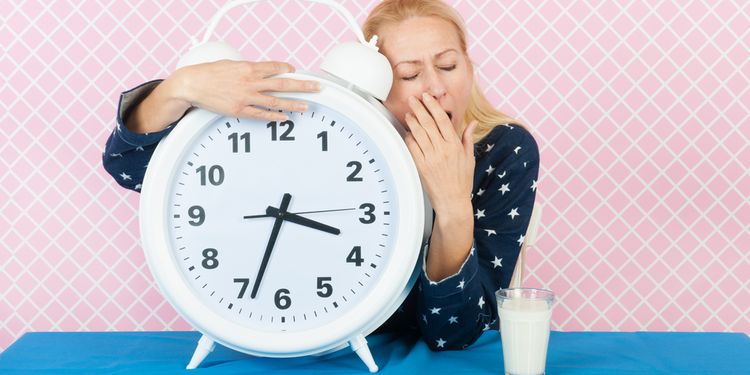
Root Cause: Sluggish Metabolism
There are many reasons why you might have a sluggish metabolism, but take a look at some of the most common culprits.
Lack of sleep is a big one, because when we lack sleep, our body has a difficult time metabolizing carbohydrates, which then triggers blood sugar levels to rise, spiking insulin.
The insulin then tells your body to store fat and that you’re hungry and need to eat. It’s a vicious cycle. Make sure you get your sleep, and always do it at the same time if possible—your body’s circadian clock loves regularity.
Eating too little can really sabotage your metabolism. Your body slows down its calorie-burning activity because it thinks you’re starving to death.
If you eat too little, your body will revert to using muscle tissue for energy, which means less muscle and less calorie burning.

Not getting enough exercise is one sure way to build up fat and slow down your metabolism.
A sedentary individual has a lower resting metabolic rate (RMR) compared to an active person. The resting metabolic rate refers to the calories burned to sustain the function of your vital organs.
Not only does an active person have a higher RMR, but they also have what’s known as excess post-exercise oxygen consumption (EPOC). That means that even after you leave the gym, you have a revved up metabolism because your body has increased oxygen utilization. Studies have revealed an increase in metabolic rate for up to 14 hours after exercise.17
Homeostatic imbalance occurs when you have a health condition that slows down your metabolism. Hypothyroidism, chronic fatigue syndrome, fibromyalgia, and Cushing disease are known to affect metabolism adversely.
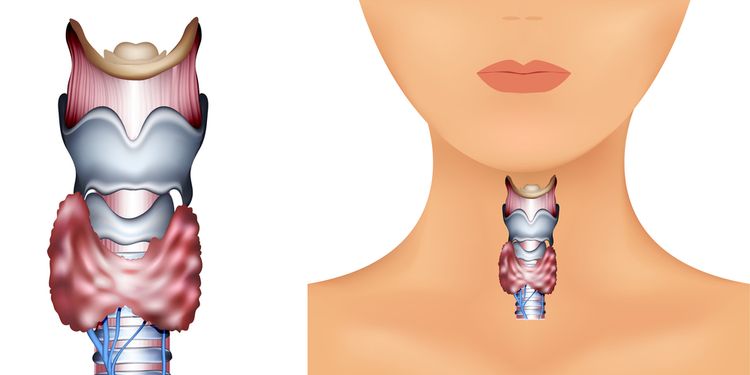
Root Cause: Hypothyroidism
Hypothyroidism affects 25 million Americans, and we know there are many more walking around undiagnosed.
The most common cause of thyroid gland failure is called autoimmune thyroiditis, or Hashimoto’s. It’s usually found in women, particularly those middle-aged and older.16
Thyroid hormone production, as with other hormones, tends to decrease with age.
According to the Life Extension Foundation, there are at least 47 symptoms of low thyroid function, and weight gain and fluid retention are among them.
Thyroid function is intimately connected with your metabolism—thyroid hormones help regulate calorie consumption. People with an underactive thyroid tend to have a very low basal metabolic rate, which translates into weight gain and difficulty losing weight.
Thyroid dysfunction can also contribute to insulin resistance and can therefore be a precursor to diabetes. High insulin levels stimulate appetite. Then, when glucose levels drop, insulin sends a signal to the brain to keep the food coming. You begin to eat when you don’t need to, and ultimately weight gain occurs.

Natural Relief from Unwanted Weight Gain
With all the information that you’ve just processed concerning the causes of weight gain issues, it’s time to offer you natural solutions that can help you get on track for some changes that will lead toward a trimmer, fitter you.
Being Present: We live such rushed lives, and many of us eat on the fly or under pressure.
Have you ever been so engrossed in thoughts about something that you can’t even remember what you ate? This is where overeating can take place, because we eat too quickly or are not present enjoying the tastes, textures, and nuances of what we’re eating.
Begin the simple practice of being present while you eat. Slow down. Focus on smaller bites, longer chewing, mindfulness of the moment, and appreciation.
If you think this is just new-age hokey stuff, think again. It’s actually far more important than you think. Your gut metabolism actually slows down when you’re stressed out. People who don’t chew their food well and eat quickly have low levels of the probiotic gastrointestinal hormones needed to synthesize nutrients. You need to be in a good parasympathetic (calm) state to get the gut to work at all.4,5

Keep a Food Journal: Health coaches tell us that this one practice alone can have a profound effect on weight loss, as it forces you to write down everything you eat and drink.
Food journaling can be very simple or very elaborate, like recording what you were doing at the time of eating or what you were feeling. Find what works best for you. You may be surprised by how much you really do eat.4
Hara Hachi Bu: In Japanese, this phrase means “eat until you’re 80% full.” Why stop short of the finish line?
Reason #1 – There’s lag time between your body and your brain. It takes 20 minutes for your brain to register satiety. That means by the time the “I’m full” memo gets from your stomach to your brain, you’re probably beyond full.
Reason #2 – Maybe our notion of the amount of food we need to be full is wrong. Will you waste away if you don’t reach the 100% mark? Nope. Ducking short of your caloric need can be beneficial for keeping your weight in check.
In fact, your notion of how much food you need may be skewed. Many Americans consume way more calories than they need. The idea here is that we delay the stomach stretch receptors that help signal satiety, and by not practicing hara hachi bu, there’s a constant stretching of the stomach which in turn increases the amount of food needed to feel full.
Drink Water: Something as simple as drinking water can have a significant effect on your weight loss journey. The minute you wake up, try to drink a liter of water. Your body is actually in a state of dehydration after you’ve (hopefully) been sleeping eight hours.
Drink pure water throughout the day, not flavor-enhanced water (which is filled with stuff you don’t want). Drink a glass of water half an hour before you eat, as it can help reduce the amount you eat.

Get Some Sleep: According to the National Sleep Foundation, 63% of American adults don’t get the recommended eight hours of sleep a night.
The less you sleep, the worse your weight-gain odds are. Sleep deprivation appears to result in decreased leptin, a hormone that regulates appetite and metabolism, and increases ghrelin, a hormone that stimulates appetite.
Columbia University researchers found that people who get four or fewer hours of sleep a night are 73% more likely to be obese than those getting seven to nine. Another study in the Annals of Internal Medicine discovered those who slept only four hours a night for two nights had a 24% increase in hunger compared with those who slept ten-hour nights.2
Practicing good sleep hygiene is also vital—like sleeping in complete darkness. In the journal Proceedings of the National Academy of Sciences, mice who were exposed to dim light gained 50% more weight than mice who slept in total darkness over an eight-week period, even though they ate the same amount of food and had the same exercise.
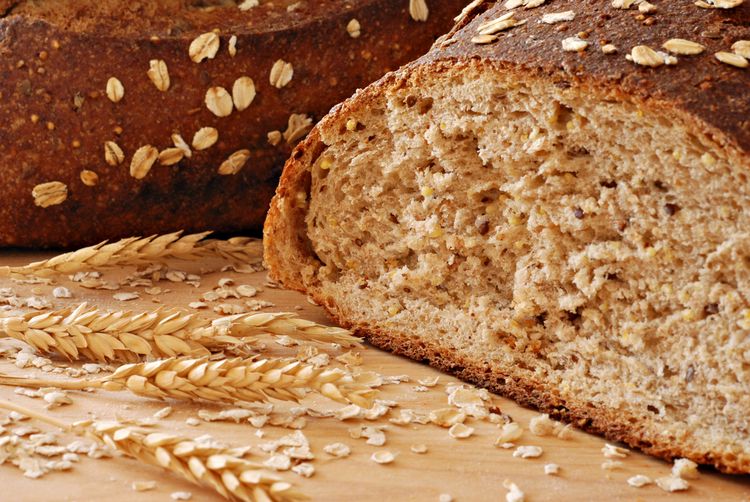
Reduce Toxins: Exposure to endocrine-disrupting chemicals such as bisphenol-A (BPA), which is found in plastic water bottles and the inside lining of most canned goods, is associated with obesity because it interferes with hormone signaling.7
This is also true of other plastics and chemicals such as dioxins, phthalates, and pesticides. Choose more natural or green options for personal care products, cleaning products, and food storage. Glass bottles and packaging tend to be best.
Experiment With Going Gluten Free: This alone can cut 10 to 25 pounds off your physique in a few months.8,9
Many people don’t tolerate gluten, and it can cause an inflammatory response as the immune system reacts to it. This inflammation can result in unwanted weight gain. Additionally, as a carbohydrate, grains break down into sugar (glucose) that’s stored as fat if it isn’t used and is responsible for much of the overweight/obesity epidemic we see today.

Eat Foods Found in Nature: Author Michael Pollan has a very good saying: “Shop the periphery of the supermarket and stay out of the middle.”
Most supermarkets are set up where the middle contains foods in cans, boxes, and bags, and everything that’s fresh is found in the periphery.
Eat a rainbow by choosing fruits and vegetables that are deep in color—purples, blues, reds, oranges, yellows, and greens. What you’re seeing in these beautiful deep colors are polyphenols and phytonutrients that our bodies crave.
When our diet is rich in these nutrient-dense foods, we have decreased inflammation, improved detoxification, better gut motility, and a gut flora rich in good bacteria.
The reason bariatric surgeries work is not because the stomach is smaller, but because you’re essentially reprogrammed to eat less. These surgeries stimulate the receptors in the small intestine, releasing gut hormones that were previously suppressed because of lifestyle factors. These hormones do things like regulate appetite, satiety, insulin sensitivity, and insulin release.10
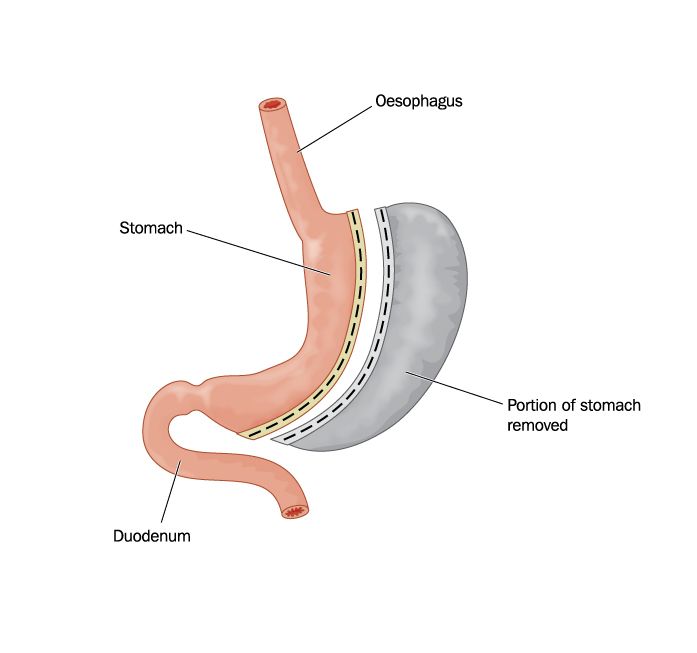
In some cases, 18 hours after bariatric surgery, Type II diabetics who are insulin-dependent no longer need to take insulin!
Studies are underway to find ways to mimic bariatric surgery through nutrition intervention and novel intestinal manipulation to create the effects of bariatric surgery without the expense and potential danger.
Thankfully, we already know some ways to mimic the effects of bariatric surgery through eating real, whole foods that naturally increase the levels of these hormones.
Fruits and vegetables are great sources of nutrients and fiber that elicit this response. Resistant starches are also powerful mimickers of what bariatric surgery does.
Resistant starches are called so because they resist digestion until they reach the colon, where they serve as food for the good bacteria. Good sources of resistant starch are rice steamed with coconut oil, cooked and cooled potatoes, green bananas, and green plantains.

Get your nutrients: Anyone following a SAD (Standard American Diet) isn’t getting the vitamins and minerals required for good weight management or overall health.
Having proper nutritional support can make your body a clean, mean, fat-burning machine.
Vitamin D: Vitamin D helps to ensure that your body responds to insulin, a hormone secreted from your pancreas that helps proper glucose utilization—pushing glucose into your cells to burn as energy. This is called insulin sensitivity, and the more sensitive your cells are to glucose, the better.
Other minerals that assist with insulin sensitivity are chromium and vanadium. The best sources are broccoli, pastured meats, fish, shellfish, parsley, and other greens. A lack of vitamin D may interfere with the hormone leptin, which controls the body’s energy balance in the brain.
Magnesium: Magnesium is also a critical component in insulin sensitivity and has an important regulatory part to play in glucose metabolism.

Protein: This macronutrient is vital for keeping your hunger in check and maintaining body composition (the amount of fat relative to muscle), in addition to preserving muscle mass as you lose weight. A recent study at the University of Illinois found that women who consumed protein twice daily lost 3.9% more weight than women who consumed less of it on a diet.
Omega-3 Fatty Acids: This powerhouse does many things to enable weight loss. First, fatty acids improve leptin signaling in the brain, turning up fat burning and turning down appetite.
Next, they switch on enzymes that assist with fat burning in the cells. It’s well-known that these fats help to boost mood, which may reduce emotional eating.
Monounsaturated Fatty Acids: These are a type of fat found in nuts, seeds, olive oil, chocolate (dark), and avocados. They keep blood sugar steady, thus reducing appetite, and actually turn up the fat-burning mechanism of the body.
The American Journal of Clinical Nutrition reported that people on a MUFA-rich diet had less body fat than the control dieters.
Conjugated Linoleic Acid: Like vitamin D and calcium, CLAs are powerful fat-burners that are found in grass-fed beef and dairy products. CLAs help glucose enter the body’s cells, where they burn as energy rather than being stored as fat.
Polyphenols: Polyphenols, and especially those found in green tea, boost your resting metabolism rate by 17%, helping your body to burn more fat.
You’ve got lots to go on now. Don’t get overwhelmed and take it one day at a time. If you can implement two important small changes per week, you’ll be in much improved health within a few weeks.
